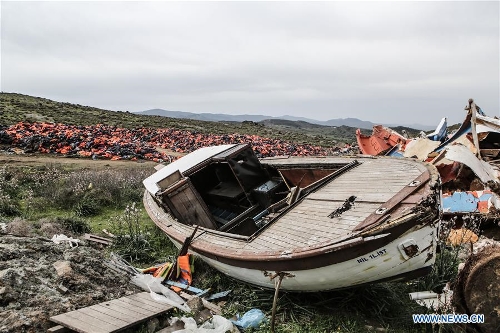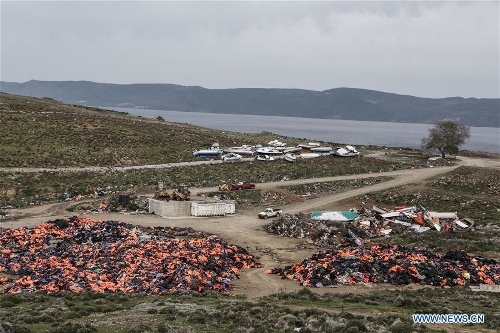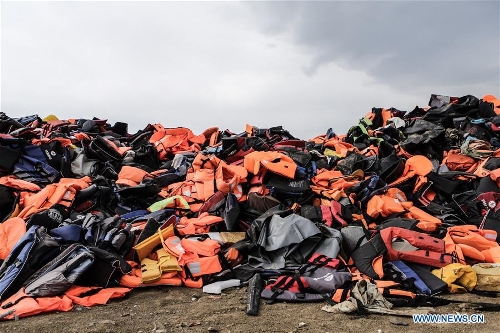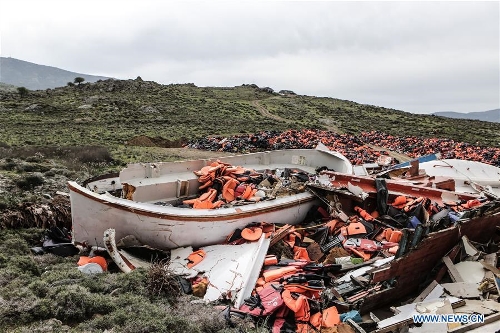Recycling program launched to clean migrant waste trail on Greek island

Life jackets and dinghies left by migrants are collected and piled up on Lesvos island, Greece, March 23, 2016. The huge "mountains" of life jackets and dinghies left behind by thousands of refugees on the beaches of the Greek island of Lesvos over the past year bring hope and possible job opportunities for recession-hit locals as authorities have launched a recycling program this spring to protect the environment and generate revenues. The municipality of Lesvos in cooperation with volunteer architects and environmentalists has started a pilot project to turn refugee waste into items of immediate use for the refugees and migrants such as bags, raincoats, mattresses and shelters. Photo: Xinhua/Lefteris Partsalis

Photo: Xinhua/Lefteris Partsalis


Photo: Xinhua/Lefteris Partsalis
The huge "mountains" of life jackets and dinghies left behind by thousands of refugees on the beaches of the Greek island of Lesvos over the past year bring hope and possible job opportunities for recession-hit locals as authorities have launched a recycling program this spring to protect the environment and generate revenues.
The municipality of Lesvos in cooperation with volunteer architects and environmentalists has started a pilot project to turn refugee waste into items of immediate use for the refugees and migrants such as bags, raincoats, mattresses and shelters, local officials told Xinhua in recent telephone interviews.
With the support of the Greek Ministry of Environment, Lesvos hopes to become an example for other islands that are affected by the refugee crisis.
Lesvos has been at the front line of the crisis during the past year. Almost half of the one million arriving in Greece since early 2015 were registered on the island.
Up to 700,000 life vests and 10,000 inflatable dinghies were left on the beaches since January 2015. They have all gradually been collected before tourists arrive for summer holidays and before the plastic materials started degrading to harm the environment, deputy mayor of Lesvos, Yorgos Katzanos, told Xinhua.
"All the beaches have been cleaned. All the materials have been collected into locations in such ways to avoid environmental pollution and the risk of fire," he explained.
"The plan is to develop an effective waste plastic recycle line which can benefit both migrants and local people. Funds raised from the sale of products can be used for the refugee community," the mayor's press officer, Marios Andriotis, added.
In addition, the municipality will create also a museum on the refugee crisis, which will be part of the European program for "Urban Innovative Actions," Andriotis said.
In front of the humanitarian disaster unfolded in the Greek islands, thousands of volunteers run to provide help. Among them was Jai Mexis, a 25-year-old architect who participated in the project.
"I visited Mytilene during the summer to support the Solidarity Kitchen, but then I realized that I had to do something about all this huge amount of garbage as well," he told Xinhua.
Using wood from the dinghies, he constructed shelters for women and children in a refugee camp near the airport. "Such a simple thing was so useful for these people," he recalled.
Although Mexis has previously worked in Jordan's Zaatari refugee camp and he was brought up in India where he has seen great poverty, he was shocked when he saw the environmental challenge on Lesvos.
Mexis has started an organization named "Odyssea," with his Greek friend Irene Psifidi, to help in the recycling of waste. He organizes workshops on how to recycle life jackets to make raincoats and bags.
"First we want to sell recycled products in local and European markets. Profits will directly fund a mobile health-care unit for both locals and refugees on the island. We are also organizing workshops on recycling inside the refugee camps. In addition, we wait to get funding for the waste plastic recycle line on Lesvos," he explained.
The plastic waste recycling line can revive textile small industries that used to be a pillar of the local economy in the past and create much needed job opportunities, according to Mexis.